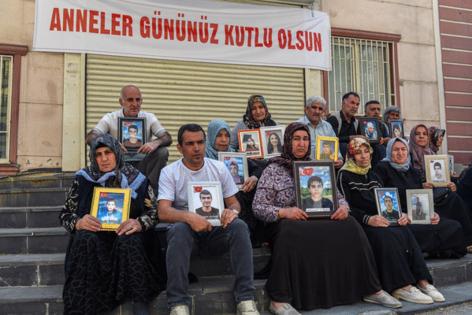Kurdish separatist group PKK ends 40-year war against Turkey
Published in News & Features
A separatist Kurdish group agreed to lay down arms to end a 40-year war for autonomy against Turkey, an historic step that could strengthen Ankara’s aspirations to become a regional powerhouse.
The PKK agreed to disarm and disband at a congress last week, the pro-Kurdish ANF news agency reported Monday, after declaring a ceasefire on March 1. That heralded the end of one of the world’s longest and bloodiest insurgencies.
The PKK’s campaign has “led the Kurdish issue to the point of solution via democratic politics,” the ANF cited a statement from the congress as saying. “In this respect, the PKK has completed its historical mission.”
The decision could enable Turkey to shift its focus from a decades-long fight against the group’s militants — both inside and out of the country — to helping rebuild war-ravaged Syria. That would be in line with U.S. goals to stabilize the region, and help ease tensions between Washington and Ankara, as the PKK was affiliated with U.S.-backed Syrian Kurdish forces.
Erdogan has been working toward resolving the Kurdish conflict to thwart what he saw as the growing threat of Kurdish nationalism in the region. If the disarmament holds, it could boost Turkey’s aspirations to reshape the Middle East and burnish support for the president as he seeks to rewrite the constitution and extend his two-decade long rule.
Turkey is now facing the question of how to address demands from the PKK and the pro-Kurdish DEM party to improve rights for the ethnic group. They are calling for recognition of Kurdish identity and culture in the country’s constitution and permission for Kurdish language teaching in schools, alongside the devolution of more powers to local authorities in Turkey’s Kurdish majority southeast.
The PKK said “it’s important for parliament to play its role with a historic responsibility” — an apparent reference to the demands.
Kurds make up almost a fifth of Turkey’s 90 million population.
It’s unclear whether Turkey will offer safe passage for the PKK’s leadership to third countries or declare amnesty for thousands of militants if they return home. The group said its imprisoned leader, Abdullah Ocalan, should lead the political process, according to the statement. Turkey expects PKK representatives in Syria to leave the country and all the group’s militants, including those based in Iraq, to surrender their weapons.
“This process will be meticulously monitored in the field by our state institutions,” Omer Celik, a spokesman for Turkish President Recep Tayyip Erdogan’s ruling AK Party, said on X. “If terrorism ends completely, the door to a new era will open.”
Ocalan founded the PKK — the Kurdistan Workers’ Party — in Turkey’s Kurdish-dominated southeast in 1978, with a manifesto that combined socialist economic principles with demands for Kurdish autonomy. The conflict has exacted a heavy toll on Turkey, costing an estimated $400 billion and killing 40,000 people – most of them Kurds – since the group took up arms in 1984. The casualties included militants, soldiers, policemen as well as civilians.
Urban centers such as Istanbul and Ankara have been repeatedly targeted in PKK-linked bombings, eroding public confidence and contributing to security concerns that weighed on tourism, investment and domestic political cohesion.
Mehmet Ucum, one of Erdogan’s top advisers who has been working on a new constitution, said “Kurds, as an inseparable part of the Turkish Nation, are the founders and perpetual owners of the Republic of Turkey.”
“The new era will strengthen Turkey in every aspect,” Ucum said in a post on X. “Comprehensive reforms in democracy and the rule of law will be implemented.”
----------
—With assistance from Beril Akman, Taylan Bilgic and Patrick Sykes.
©2025 Bloomberg L.P. Visit bloomberg.com. Distributed by Tribune Content Agency, LLC.







Comments